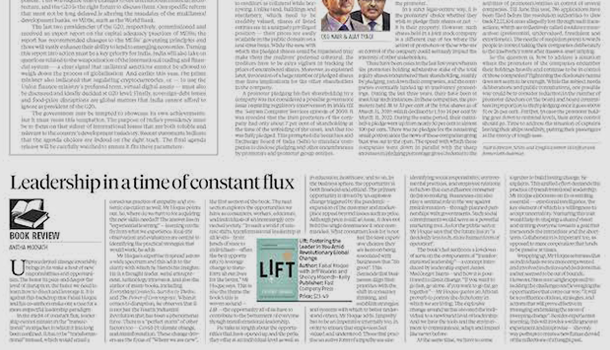
Adjust your expectations before setting out. The outcome can fall short of your ideal and still count as success.
BY FAISAL HOQUE
Sure, you’ve set some New Year’s resolutions and told yourself this is going to be the year when you actually follow through with them. But more often than not, we fail, but not because the goals we set are too ambitious to achieve.
Instead, it’s often because we haven’t taken the time to adjust our mind-sets and mental habits in ways that help us make significant, lasting changes. And sometimes that comes down to avoiding negative patterns of thinking in addition to adopting more positive ones. Here are six such mental adjustments to help you start the year off right.
1. STOP FEARING FAILURE
Before we even set out on a new undertaking, many of us are beset by doubts about our ability. We’re apprehensive and hesitant to try something different than what we’ve grown used to doing.
This is pretty normal. Risk is something we as humans have evolved to detect and consider before making big decisions, and much of the time, it serves us well. But occasionally it furnishes us with excuses to put off doing something meaningful. A voice in our head says, “I don’t have the time or the money,” “I’m not sure I can pull this off,” or “Not right now. I’ll come back to this in a few months.”
Self-sabotage is any kind of behavior or way of thinking that keeps from going after our most ambitious goals. And it originates in a fear of failure. We need to confront that anxiety before setting off on any major undertaking, but that doesn’t mean conquering it altogether.
Simply recognize that you might indeed fail. It’s okay—and in fact important—to know your odds of success, but you can’t let them overwhelm you before getting started.
Related: 7 Methods To Overcome Your Fear of Failure
2. GET A HANDLE ON TOXIC EMOTIONS
Emotions are a natural part of being a human, and controlling them doesn’t mean becoming an android. But how well we manage what we’re feeling affects not just our own performance but our interactions with others. We’ve all been around someone who leaves you feeling exhausted and drained. Chances are you don’t like working with them.
EMOTIONS ARE A NATURAL PART OF BEING A HUMAN, AND CONTROLLING THEM DOESN’T MEAN BECOMING AN ANDROID.
Keep in mind that you’ll probably need to work with others in some form or another in order to achieve what you’ve set your sights on. If you become that kind of person, you’ll chase away potential collaborators, mentors, partners, and others. Cultivate an attitude that attracts support rather than repels it.
By the same token, guard against the toxic emotions that others may bring into your orbit. That takes intentional and constant effort. The people we surround ourselves with can make the difference between failure and success just as much as our own emotional self-control can.
Related: Slay The Emotional Vampires That Are Holding You Back
3. QUIT TRYING TO PLEASE EVERYONE
Trying to please everyone is like trying to fit the entire ocean into a cup; it’s impossible. Whatever good we do, and however good we become, people who think little of our plans or achievements will always show up and let us know about it.
Before we worry about what others think, we need to commit to love and accept ourselves. If that sounds like a self-help bromide, it’s nevertheless one of deep practical importance. If we’re unhappy with ourselves, that self-reproach trickles into all of our relationships, our work, our beliefs, and our future.
There are three components of becoming more authentic and resilient through self-acceptance:
- Self-love
- Self-expression
- Self-confidence
It’s from self-acceptance that we discover the complexities of our emotions, vulnerabilities, and imperfections. That’s the basis of true authenticity—without which we’re usually unable to grow to our full potential.
How come? Because without it, we wind up wasting our energies where we shouldn’t. The need for approval from others destroys our freedom to succeed on our own terms. When the desire to get people to like us motivates our personal and professional choices, we only go backward.
4. TAKE NOTHING FOR GRANTED
No matter how self-motivated or driven we may be, our lives are constantly being shaped by external forces. Successful people don’t take things for granted. They consciously practice gratitude. If you’re making a fresh start of any kind, you’ll need to do the same.
Don’t just take the time to determine what you’re thankful for; express your thanks as well. Show appreciation for others and return the kindness others offer you. The act of showing gratitude isn’t just a one-way thing, after all. It changes our lives in a handful of ways:
It makes us more patient.
It boosts our self-confidence.
It fortifies our relationships with others
It helps us rethink our goals and determine why they matter.
Related: The Surprising Benefits of Gratitude
5. BE OKAY WITH IMPERFECTION
Paradoxically, it’s only by embracing imperfection that we maximize our chances of success. Setting too-high standards lead us to dismiss talented people out of hand, ignore big opportunities, and fail to contribute our all to worthy causes. Holding out for something better, in other words, usually leaves us worse for the wear.
As one ancient folk adage has it, you pull the string too tight, it will snap. If you leave it too loose, it won’t make music when plucked. Adjust your expectations before you set out on something new. Know that the outcome can still fall short of your ideal and still count as success.
Related: 7 Daily Mantras To Boost Your Productivity
6. DISMOUNT YOUR HIGH HORSE
There’s a word for not knowing: Ignorance. It’s true that the term carries a negative connotation; if someone calls us ignorant, we leap to defend our egos.
But sometimes ignorance is an important prerequisite for accomplishing big things. We can be skillfully ignorant by acknowledging that it’s a complex, maybe even opaque world we’re just setting foot in. That simple recognition can help us get our bearings, providing a framework for expanding our knowledge base before striding forward. Other times, of course, ignorance is just ignorance—causing us to do exactly that, and stride blindly forward.
But we can actually learn to be good at being ignorant: At an individual level, we can learn how to strategically acquire the new skills that will be demanded of us. And at interpersonal and organizational levels, we can surround ourselves with people who fill in our blind spots—then treat them in a way that encourages them to keep offering their guidance.
A beginner’s mind, then, can be an asset. But only if you take the right approach—avoiding negative patterns—for making a new beginning.
Related: Release Your Inner Genius With These 5 Tips
Serial entrepreneur Faisal Hoque is the founder of Shadoka. Shadoka enables entrepreneurship, growth, & social impact. He is the author of Everything Connects: How to Transform and Lead in the Age of Creativity, Innovation, and Sustainability(McGraw-Hill) and other books. Use the Everything Connects leadership app for free.
Copyright (c) 2015 by Faisal Hoque. All rights reserved.
Original Article @FastCompany.















